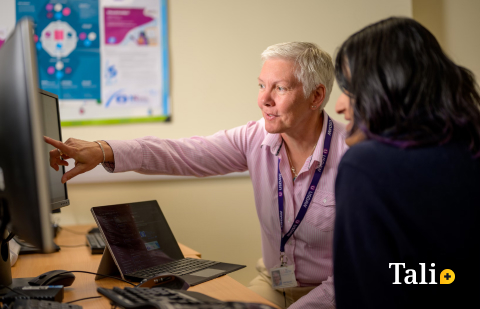Artificial Intelligence (AI) is a transformative force in the healthcare industry. It’s not just a technological advancement; it’s a paradigm shift that is enhancing human capabilities and revolutionizing healthcare delivery.
Applications of AI
AI has a broad spectrum of applications in healthcare, each with the potential to transform a different aspect of the industry. Here are some key applications:
Diagnostics: AI algorithms, trained on vast datasets of medical images, can analyze these images to detect diseases. These algorithms can identify patterns and anomalies that may be indicative of disease, often with the same or even superior accuracy to human doctors.
Personalized medicine: AI can analyze a patient’s genetic information, lifestyle factors, and other health data to recommend personalized treatment plans. This approach, known as precision medicine, can lead to more effective treatments and better patient outcomes.
Administrative tasks: AI can automate administrative tasks, such as scheduling appointments, managing patient records, and processing insurance claims. This can save healthcare professionals valuable time and reduce the risk of errors.
| Application | Description |
|---|
Diagnostics | AI algorithms, trained on vast datasets of medical images, can analyze these images to detect diseases. These algorithms can identify patterns and anomalies that may be indicative of disease, often with the same or even superior accuracy to human doctors. |
Personalized medicine | AI can analyze a patient’s genetic information, lifestyle factors, and other health data to recommend personalized treatment plans. This approach, known as precision medicine, can lead to more effective treatments and better patient outcomes. |
Administrative tasks | AI can automate administrative tasks, such as scheduling appointments, managing patient records, and processing insurance claims. This can save healthcare professionals valuable time and reduce the risk of errors. |
Benefits of AI to Healthcare

Benefits of AI to Healthcare
The benefits of AI in healthcare are manifold. Here are some key benefits:
Improved efficiency: By automating routine tasks, AI can significantly improve efficiency in healthcare settings. This can free up healthcare professionals to focus more on patient care.
Enhanced accuracy: AI algorithms can reduce human error, enhancing the accuracy of diagnoses and treatments.
Better patient outcomes: By providing personalized care and improving efficiency and accuracy, AI can lead to better patient outcomes.
Challenges and Concerns
Despite its immense potential, AI also presents several challenges and ethical concerns. These include:
Data privacy issues: The use of AI in healthcare often involves processing sensitive health data, raising concerns about data privacy and security.
Risk of algorithmic bias: If the data used to train AI algorithms is biased, the algorithms themselves can also be biased, leading to unfair outcomes.
Need for transparency: AI algorithms are often seen as “black boxes” that provide outputs without explaining how they arrived at these outputs. This lack of transparency can be a major concern in healthcare, where understanding the reasoning behind a diagnosis or treatment decision is crucial.
Current Use Cases
Several healthcare institutions and companies are already leveraging AI to improve patient care. For instance, Google’s DeepMind has developed an AI system that can diagnose eye diseases with the same accuracy as human doctors. Similarly, IBM’s Watson Health uses AI to analyze a patient’s medical data and suggest treatment options.
AI Medical Scribe Companies
Companies like Tali AI are pioneering the use of AI to combat physician burnout. Tali AI has developed advanced voice-recognition and AI-driven technologies to deliver a seamless voice interface for Electronic Health Records (EHRs). By streamlining and speeding up documentation tasks, Tali AI is addressing one of the most time-consuming aspects of patient care, thereby enabling healthcare professionals to focus more on patients and less on paperwork.
Future Trends
Emerging trends in AI, such as machine learning and natural language processing, have the potential to further transform the healthcare sector. These technologies can enable more sophisticated diagnostic tools, predictive analytics, and patient-centric care models.
Patient Engagement
AI can enhance patient engagement by providing personalized health information, reminders for medication, and virtual health assistants. This can empower patients to take an active role in their healthcare.
Regulatory Landscape
The regulatory landscape for AI in healthcare is evolving. While there are currently no specific regulations for AI, existing laws on data protection and medical devices apply. Regulatory bodies like the FDA are also working on guidelines for AI in healthcare.
Collaboration with Healthcare Professionals
AI is not meant to replace healthcare professionals, but to augment their capabilities. By taking over routine tasks, AI allows healthcare professionals to focus more on patient care. This collaborative approach ensures that AI serves as a tool to enhance human capabilities, rather than replace them.
Conclusion
AI has the potential to revolutionize healthcare, but it also presents several challenges and ethical concerns. As we continue to explore the possibilities of AI in healthcare, it’s important to ensure that it is used responsibly and ethically. We invite you to share your thoughts and experiences in the comments below.